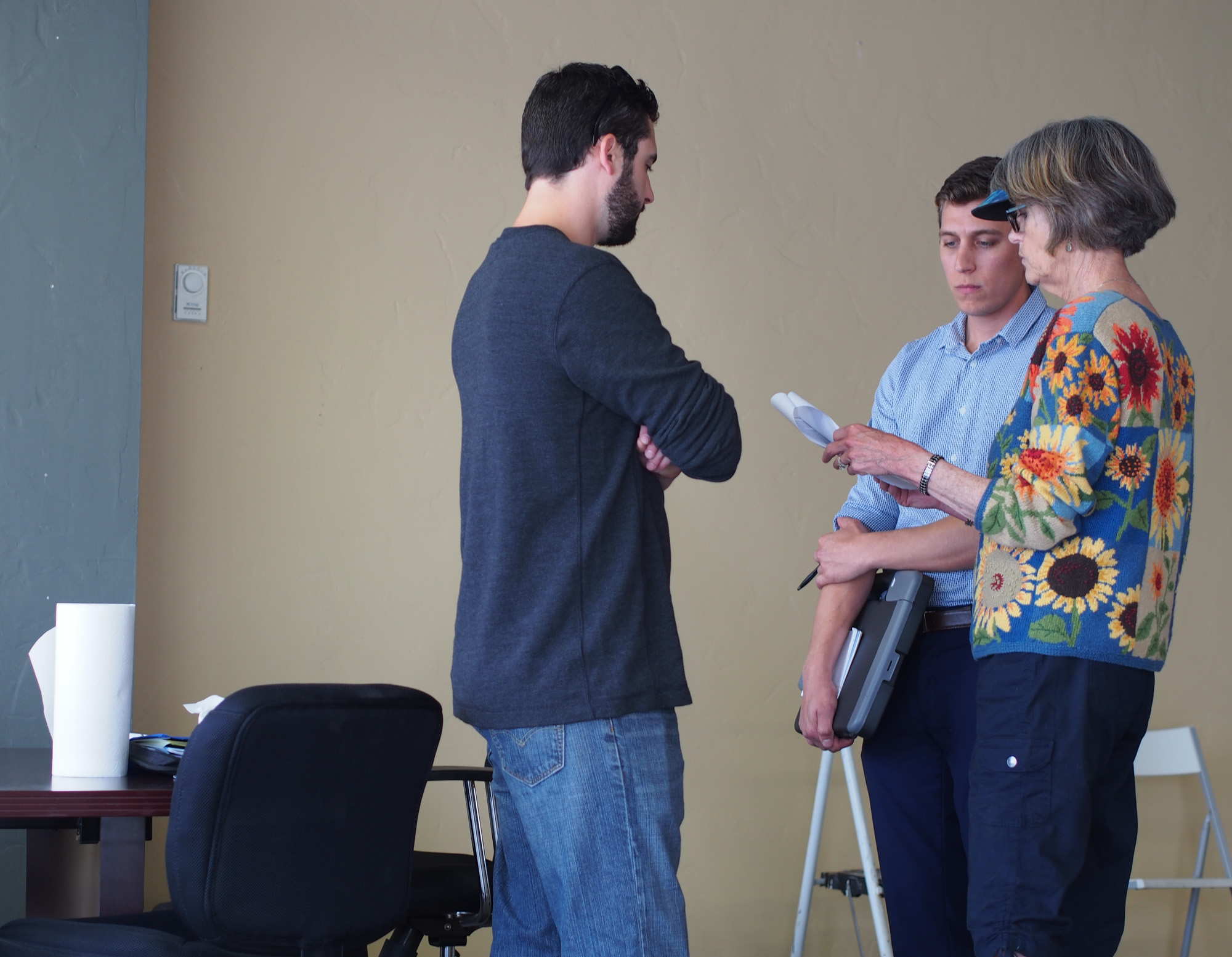
Over the last few weeks, many Alaskans have been trying something new: walking into a store to buy pot.
For more than a year, Alaska Public Media has been profiling one family cannabis business as they try to break into the new industry.
Now, they’re finally open for business, but not without some lingering concerns.
On a recent weekday evening, a two-person band played in the corner as dozens of people chatted, inspected glass pipes and bought small bags of cannabis. It was the soft opening for Enlighten Alaska, the latest in a handful of cannabis retailers to start in Anchorage and across the state.
Standing behind a glass display case was Victoria Davis, an employee with tattoos and long hair fading from blond to blue.
“I am a bud-tender here,” Davis explained. Bud-tenders are sales-people.
Davis’s job is talking with customers and answering questions, whether that’s a price check for a certain strain of pot or fielding inquiries about biochemistry.
I’m there to shop: to see what it’s like to make a purchase in Alaska’s newest industry. When Davis gets customers like me who aren’t particularly familiar with cannabis, she starts with a few basic questions about what kind of experience he or she wants from the drug.
“I ask them what they want to feel,” Davis said. “It just really depends on what you’re looking to receive out of the benefits of cannabis.”
Davis called this approach “consuming with intention.”
She got her start bud-tending at a medical dispensary in Michigan and now is one of the seven part-time employees working at Enlighten.
The shop has a one-page menu of cannabis products that I stare at, not sure which one is right for me.
Davis shows me glass jars filled with assorted marijuana buds: Blue Dream, Afgooey, Lost Coast.
She noted their potency, along with their effects on mood, energy and awareness.
A gram of these strains costs $22 — which, depending on quality and quantity, can be almost double what you might spend outside a legal business. But built into the prices here are costs for testing, taxes to the state, security cameras, heating the store and the professional guidance of an employee like Davis, who holds a jar of White Lemon buds up to my nose.
“I think that one smells pretty fresh,” Davis observed. “Almost like a Christmas tree, but not quite.”
There are other products, too. Edibles with names like “CannaCrisps” ($15 for two servings) and “Dank Chip Cookies” ($25 for four). Concentrated oils run a bit higher.
Under Davis’s advice, I decide on a strain called Vanilla Kush, which is on the lower end potency-wise, but I’m told it’s a good fit for relaxing in front of a movie before bed.
“Would you like a receipt?” Davis asked as she rang me up on an iPad.
I have to pay in cash, because marijuana businesses in Alaska and the Lower 48 don’t comply federal banking laws.
Davis tucked the small bag with a pinch of pot inside a white plastic envelope guarded by an elaborate child-proof zipper.
Overall it’s an extremely regulated purchase: my ID was checked twice; there was testing data all over the packaging as well as displays; and I got a lot of advice from an employee about the good I ultimately bought.
Getting the business to this point has not been easy.
“I’d say the risk that we took was investing our retirement funds and everything that we have,” Leah Levinton said.
She’s one of Enlighten’s three owners, along with her brother and mother.
She estimated that getting to this day, took $330,000 to $340,000. Almost double what they planned for.
“There’s no option but to be a successful business,” Levinton said with a chuckle.
Beyond the financial hardship, the family struggled a different points in time to prepare their permit application to the state, navigate local zoning rules and remodeling their shop to meet all the requirements.
Levinton also had to keep her involvement in the cannabis industry under wraps for months while she finished up at her previous job, basically putting in a second shift after work most days.
“It’s called ‘coming out green,’” Levinton said of transitioning toward being public about her involvement with cannabis. “This is a dream come true. This is something I never thought I’d be doing in my life.”
Both she and her mother, Jane Stinson, know there are major challenges ahead.
The overhead costs for cannabis retail shops are high. There still isn’t enough cannabis being legally grown in Alaska to re-stock stores quickly when they sell out.
“We would buy a lot of product if it were available, because I know the market is there,” Stinson said.
Enlighten is benefiting from starting a few weeks behind other Anchorage stores. They’re open for just six hours, three days a week, essentially rationing the product so that it is consistently available.
And they’ve gotten a glimpse from other retailers about what kinds of products are selling the best.
“They’re buying a lot of edibles and high THC flower,” Stinson said.
She attributed this in part to peoples’ assumptions that they want the strongest, highest potency types of cannabis and a general lack of familiarity with lighter strains.
When the shop runs out of product they won’t be able to get more until the end of February at the earliest.
Stinson expects the business will begin breaking even in May, once enough cultivators have opened to keep stores consistently stocked and open.
Still, Stinson doesn’t hesitate to explain that the difficulties have been worth it to get to this day.
“We’re so excited. So excited,” Stinson added for emphasis. “So many people have been congratulating us. And have been waiting for it!”
Stinson’s biggest concern now is that a Justice Department under nominee Sen. Jeff Sessions, R-Ala., could change federal policies toward cannabis, throwing the state markets into turmoil.